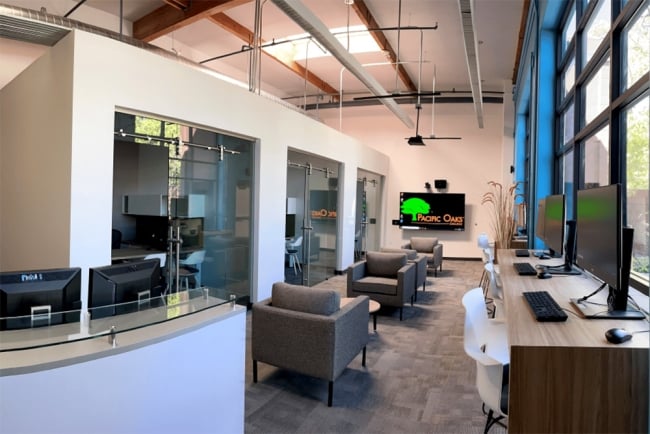You have /5 articles left.
Sign up for a free account or log in.

Students can receive help in English or Spanish at the Pacific Oaks College Student Success Center from tutors or success coaches.
Pacific Oaks College
As part of a larger Hispanic-serving institution grant award, Pacific Oaks College in Pasadena, Calif., established bilingual tutoring, offering near-peer assistance for Hispanic learners in Spanish.
The service has helped improve students’ academic outcomes, as well as inspired confidence in their abilities and made them more likely to engage with other departments on campus.
The inspiration: In K-12 schools, English language learners are more likely to receive bilingual support as they navigate English courses, but the practice is less common in higher education. Writing centers are uniquely positioned to support bilingual students in honing their skills, but connecting concepts across languages is a demand that extends beyond composition courses.
“It’s about that liberty of expression you have in both languages and there is no hesitation to use [them],” says Judy Castro, HSI project director at Pacific Oaks.
Tutoring in general has a negative perception associated with it, which can deter students from seeking help, and this is true in the Latino community as well, says Melissa Valle, associate director and student success coach.
“There’s a stigma of, ‘If I need help, then I’m dumb. I’m not getting it. I don’t belong,’” Valle says. “It’s very important for us at the center and at Pacific Oaks College for that student to feel welcome.”
Providing services in a person’s native language automatically helps them feel more relaxed, calm and open to engaging with staff, which can promote feelings of belonging, Castro adds.
Survey Says
A 2024 Student Voice survey by Inside Higher Ed found 15 percent of students believe offering more tutoring services is an institutional action that would most increase their academic success.
The background: In 2020, the college received a $2.5 million Title V Hispanic-Serving Institution grant from the U.S. Education Department to increase graduation rates, academic performance and a sense of belonging for Latino students at the institution. Along with bilingual tutoring, the student success center also offers a lending library for laptops and books, student success coaching and social programming.
Another grant-funded initiative is a bilingual podcast that provides success tips for current learners and showcases role models and stories of encouragement for potential students and their families.
How it works: When students reach out to the college’s Student Success Center asking about coursework help, coaches connect that student with a graduate student tutor via Zoom or in person, explains Valle.
To be eligible as tutors, graduate students must have completed the course in question and demonstrated mastery in the subject. The center employs four bilingual tutors, who work about 20 hours per week and earn an hourly wage. Tutors are available Monday through Friday, as well as on weekends, based on student needs and availability.
Pacific Oaks doesn’t offer degree programs in Spanish, so the initiative helps students successfully complete their courses in English. Bilingual tutoring is available for undergraduate courses.
All of the student success center’s marketing is in English and Spanish, helping reinforce the idea that these services are relevant to all learners.
The impact: In the past four years, 65 percent of undergraduate students at Pacific Oaks have engaged with the center across services. Among students who regularly participate in one or more services, they have a 54 percent higher course completion rate compared to students who did not, Castro says.
On a personal level, students who engage with bilingual services say they have a newfound confidence and feel more ready to engage in their academics.
“When students come in and they’re speaking to myself or to the tutors and they’re speaking in Spanish, they’re like, ‘I just didn’t understand it in English. But now that I can see it in this way, I can go back and write it [out],’” Valle says. “When we see that light bulb click, it’s the most amazing thing.”
The services have also spread through word of mouth among students, signaling to staff that students feel seen and comfortable in their student success center.
Castro attributes much of the center’s success to buy-in from across campus.
“It requires commitment from every level of the institution from administrative [leaders] to the faculty to student services,” Castro says. “We are proud of the progress that we made at Pacific Oaks, but we also recognize that there is more work to be done.”
Get more content like this directly to your inbox every weekday morning. Subscribe here.




